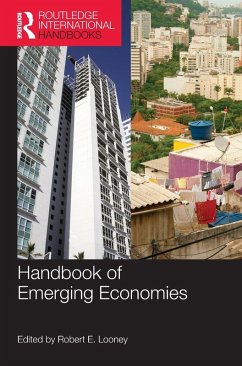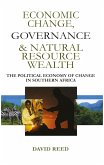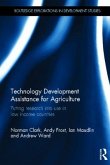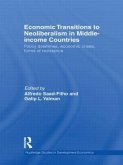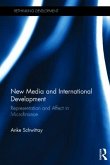Handbook of Emerging Economies
Herausgeber: Looney, Robert
Handbook of Emerging Economies
Herausgeber: Looney, Robert
- Gebundenes Buch
- Merkliste
- Auf die Merkliste
- Bewerten Bewerten
- Teilen
- Produkt teilen
- Produkterinnerung
- Produkterinnerung
A new volume in the Routledge International Handbooks series analysing emerging and newly emerged economies, including the BRIC countries and other candidates for emerging economy status, offering an overview of issues in development economics.
Andere Kunden interessierten sich auch für
![Economic Change Governance and Natural Resource Wealth Economic Change Governance and Natural Resource Wealth]() David ReedEconomic Change Governance and Natural Resource Wealth115,99 €
David ReedEconomic Change Governance and Natural Resource Wealth115,99 €![Migration, Transfers and Economic Decision Making Among Agricultural Households Migration, Transfers and Economic Decision Making Among Agricultural Households]() Migration, Transfers and Economic Decision Making Among Agricultural Households180,99 €
Migration, Transfers and Economic Decision Making Among Agricultural Households180,99 €![Technology Development Assistance for Agriculture Technology Development Assistance for Agriculture]() Norman ClarkTechnology Development Assistance for Agriculture197,99 €
Norman ClarkTechnology Development Assistance for Agriculture197,99 €![Routledge Handbook of Global Economic History Routledge Handbook of Global Economic History]() Routledge Handbook of Global Economic History319,99 €
Routledge Handbook of Global Economic History319,99 €![Economic Transitions to Neoliberalism in Middle-Income Countries Economic Transitions to Neoliberalism in Middle-Income Countries]() Economic Transitions to Neoliberalism in Middle-Income Countries135,99 €
Economic Transitions to Neoliberalism in Middle-Income Countries135,99 €![Financing Innovation Financing Innovation]() Financing Innovation187,99 €
Financing Innovation187,99 €![New Media and International Development New Media and International Development]() Anke SchwittayNew Media and International Development180,99 €
Anke SchwittayNew Media and International Development180,99 €-
-
-
A new volume in the Routledge International Handbooks series analysing emerging and newly emerged economies, including the BRIC countries and other candidates for emerging economy status, offering an overview of issues in development economics.
Hinweis: Dieser Artikel kann nur an eine deutsche Lieferadresse ausgeliefert werden.
Hinweis: Dieser Artikel kann nur an eine deutsche Lieferadresse ausgeliefert werden.
Produktdetails
- Produktdetails
- Verlag: Taylor & Francis
- Seitenzahl: 626
- Erscheinungstermin: 10. März 2014
- Englisch
- Abmessung: 257mm x 180mm x 43mm
- Gewicht: 1474g
- ISBN-13: 9781857436709
- ISBN-10: 1857436709
- Artikelnr.: 39383655
- Herstellerkennzeichnung
- Libri GmbH
- Europaallee 1
- 36244 Bad Hersfeld
- gpsr@libri.de
- Verlag: Taylor & Francis
- Seitenzahl: 626
- Erscheinungstermin: 10. März 2014
- Englisch
- Abmessung: 257mm x 180mm x 43mm
- Gewicht: 1474g
- ISBN-13: 9781857436709
- ISBN-10: 1857436709
- Artikelnr.: 39383655
- Herstellerkennzeichnung
- Libri GmbH
- Europaallee 1
- 36244 Bad Hersfeld
- gpsr@libri.de
Professor Robert E. Looney is a Distinguished Professor at the Naval Postgraduate School, Monterey, California, who specializes in issues relating to economic development in the Middle East, East Asia, South Asia and Latin America. He has published 22 books and more than 250 articles in professional journals. As an international consultant, Dr Looney has provided advice and assistance to various governments and international organizations.
Foreword Part 1: Introduction-Overview 1.1. Introduction 1.2. Key Trends in
the World Economy Part 2: The BRICSs 2.1. Brazil 2.2. Russia 2.3. India
2.4. China 2.5 South Africa Part 3: Key Lessons: The Transition to Emerging
Status 3.1. Modern Stage Theories and their Relevance for Emerging
Economies 3.2. Beijing Consensus versus Washington Consensus Part 4:
Diverse Success Stories 4.1. Israel 4.2. Singapore's Success: After the
Miracle 4.3. The Original Sin in Chile's Successful History of Development
Part 5: Likely Success Stories 5.1. Turkey 5.2. Indonesia's Ways to
Sustainable Economic Growth and Development 5.3. Mexico: Emerging Economy
Kept on a Leash by Mismatched Monopolies 5.4. Middle Income Trap of
Malaysian Economy: A Political Economy Analysis Part 6: Possible
Candidates: The Difficult Road Ahead 6.1. Argentina's Present and its
Intriguing Economic History 6.2. Vietnam 6.3. The Philippines: Road to
Begin an Emerging Economy 6.5. Pakistan: An Economy in Extreme Distress
that could be Revived 6.6. Egypt: Too `Big' to Succeed? 6.7. Thailand:
Economic Progress and the Move to Populism 6.9. Iran at a Crossroad 6.10.
Colombia: Seeking Prosperity through Peace 6.11. The Saudi Arabian Model
Part 7: Assessing the Future 7.1. The Emerging Powers and Global
Governance: Why the BRICS Matter 7.2. Challenges of Managing Emerging
Economies 7.3. Korea: An Unexpected Journey from Rags to Riches, from
Crisis to Recovery 7.4. China and India, 2025: A Macroeconomic Assessment
the World Economy Part 2: The BRICSs 2.1. Brazil 2.2. Russia 2.3. India
2.4. China 2.5 South Africa Part 3: Key Lessons: The Transition to Emerging
Status 3.1. Modern Stage Theories and their Relevance for Emerging
Economies 3.2. Beijing Consensus versus Washington Consensus Part 4:
Diverse Success Stories 4.1. Israel 4.2. Singapore's Success: After the
Miracle 4.3. The Original Sin in Chile's Successful History of Development
Part 5: Likely Success Stories 5.1. Turkey 5.2. Indonesia's Ways to
Sustainable Economic Growth and Development 5.3. Mexico: Emerging Economy
Kept on a Leash by Mismatched Monopolies 5.4. Middle Income Trap of
Malaysian Economy: A Political Economy Analysis Part 6: Possible
Candidates: The Difficult Road Ahead 6.1. Argentina's Present and its
Intriguing Economic History 6.2. Vietnam 6.3. The Philippines: Road to
Begin an Emerging Economy 6.5. Pakistan: An Economy in Extreme Distress
that could be Revived 6.6. Egypt: Too `Big' to Succeed? 6.7. Thailand:
Economic Progress and the Move to Populism 6.9. Iran at a Crossroad 6.10.
Colombia: Seeking Prosperity through Peace 6.11. The Saudi Arabian Model
Part 7: Assessing the Future 7.1. The Emerging Powers and Global
Governance: Why the BRICS Matter 7.2. Challenges of Managing Emerging
Economies 7.3. Korea: An Unexpected Journey from Rags to Riches, from
Crisis to Recovery 7.4. China and India, 2025: A Macroeconomic Assessment
Foreword Part 1: Introduction-Overview 1.1. Introduction 1.2. Key Trends in
the World Economy Part 2: The BRICSs 2.1. Brazil 2.2. Russia 2.3. India
2.4. China 2.5 South Africa Part 3: Key Lessons: The Transition to Emerging
Status 3.1. Modern Stage Theories and their Relevance for Emerging
Economies 3.2. Beijing Consensus versus Washington Consensus Part 4:
Diverse Success Stories 4.1. Israel 4.2. Singapore's Success: After the
Miracle 4.3. The Original Sin in Chile's Successful History of Development
Part 5: Likely Success Stories 5.1. Turkey 5.2. Indonesia's Ways to
Sustainable Economic Growth and Development 5.3. Mexico: Emerging Economy
Kept on a Leash by Mismatched Monopolies 5.4. Middle Income Trap of
Malaysian Economy: A Political Economy Analysis Part 6: Possible
Candidates: The Difficult Road Ahead 6.1. Argentina's Present and its
Intriguing Economic History 6.2. Vietnam 6.3. The Philippines: Road to
Begin an Emerging Economy 6.5. Pakistan: An Economy in Extreme Distress
that could be Revived 6.6. Egypt: Too `Big' to Succeed? 6.7. Thailand:
Economic Progress and the Move to Populism 6.9. Iran at a Crossroad 6.10.
Colombia: Seeking Prosperity through Peace 6.11. The Saudi Arabian Model
Part 7: Assessing the Future 7.1. The Emerging Powers and Global
Governance: Why the BRICS Matter 7.2. Challenges of Managing Emerging
Economies 7.3. Korea: An Unexpected Journey from Rags to Riches, from
Crisis to Recovery 7.4. China and India, 2025: A Macroeconomic Assessment
the World Economy Part 2: The BRICSs 2.1. Brazil 2.2. Russia 2.3. India
2.4. China 2.5 South Africa Part 3: Key Lessons: The Transition to Emerging
Status 3.1. Modern Stage Theories and their Relevance for Emerging
Economies 3.2. Beijing Consensus versus Washington Consensus Part 4:
Diverse Success Stories 4.1. Israel 4.2. Singapore's Success: After the
Miracle 4.3. The Original Sin in Chile's Successful History of Development
Part 5: Likely Success Stories 5.1. Turkey 5.2. Indonesia's Ways to
Sustainable Economic Growth and Development 5.3. Mexico: Emerging Economy
Kept on a Leash by Mismatched Monopolies 5.4. Middle Income Trap of
Malaysian Economy: A Political Economy Analysis Part 6: Possible
Candidates: The Difficult Road Ahead 6.1. Argentina's Present and its
Intriguing Economic History 6.2. Vietnam 6.3. The Philippines: Road to
Begin an Emerging Economy 6.5. Pakistan: An Economy in Extreme Distress
that could be Revived 6.6. Egypt: Too `Big' to Succeed? 6.7. Thailand:
Economic Progress and the Move to Populism 6.9. Iran at a Crossroad 6.10.
Colombia: Seeking Prosperity through Peace 6.11. The Saudi Arabian Model
Part 7: Assessing the Future 7.1. The Emerging Powers and Global
Governance: Why the BRICS Matter 7.2. Challenges of Managing Emerging
Economies 7.3. Korea: An Unexpected Journey from Rags to Riches, from
Crisis to Recovery 7.4. China and India, 2025: A Macroeconomic Assessment

